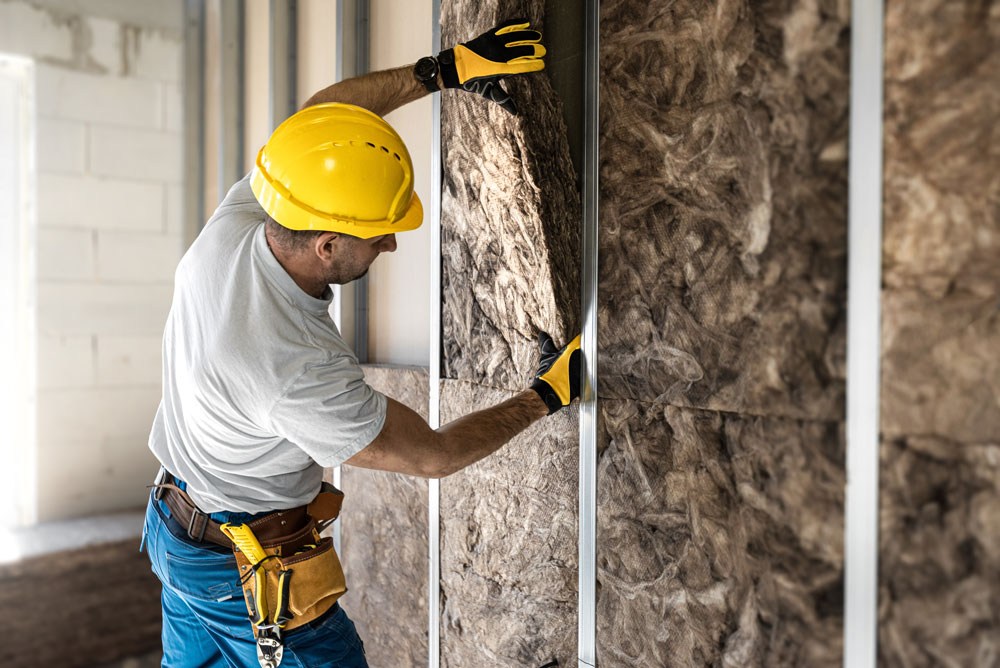Does Acoustic Insulation Have Thermal Properties?
 CONTENTS
CONTENTS
- What is acoustic insulation?
- What is thermal insulation?
- Can acoustic insulation also provide thermal insulation properties?
- Should you go for acoustic or thermal insulation?
- Frequently asked questions
- Get in touch
Acoustic insulation can absorb sound waves and reduce noise levels, making your home a more peaceful space or providing an effective solution for soundproofing. Some even claim acoustic insulation can also be used for thermal insulation.
Here at ICE Thermal, we offer a range of professional thermal insulation services, including acoustic insulation and thermal insulation installation. We have operatives stationed across the UK who are available 24/7, 365 days a year.
Keep reading to find out more about whether acoustic insulation can keep your home warm.
What is acoustic insulation?
Acoustic insulation is designed to absorb sound waves and trap vibrations, and stops noise from passing through a structure, like a wall or a floor. Sound absorption occurs when sound waves enter the pores of a material and get trapped in it. Friction and viscosity resistance then convert this sound energy into kinetic energy.
Acoustic installation can reduce the noise coming from outside the property or even between different rooms in your building. It comes in a range of materials including foam, mineral wool, and fibreglass.
UK building regulations might require certain levels of soundproofing for your property depending on where you live and the kind of property you own.
What is thermal insulation?
Thermal insulation keeps the warmth in and the cold out, or vice versa during the hotter months. The materials that comprise heat insulation reduce heat loss or gain by providing a barrier between areas that are significantly different in temperature. Thermal insulators come in various forms including:
- Rigid foam boards which consist of lots of air pockets which trap warm air and slow down the conduction of heat
- Reflective foils which reflect thermal radiation
- Eco-friendly options like sheep wool
The insulation is usually placed in interior walls and any other crevices. A well-insulated building will not just keep you warm and cool; it can save on energy bills and shrink your carbon footprint, too. You can find out more about how insulation works here.
Can acoustic insulation also provide thermal insulation properties?
The same dense materials that stop soundwaves from moving through a structure can keep heat from escaping or entering your home. However, the opposite is arguably more effective: thermal bulk insulation can be quite effective at stopping noise transfer.
The problem with acoustic insulation is that it has to be of a high enough density to be classified as soundproof, whereas thermal insulation must be of a low density to trap pockets of air. It is not an effective alternative to thermal insulation and should therefore not be used in the place of it.
Should you go for acoustic or thermal insulation?
The type of insulation you should install in your property depends on the building itself, the area it is located in, and your personal preferences.
If you live in a noisy area, such as near motorways or an airport and lots of planes are taking off and landing near your property, acoustic insulation is best. Even if you don't need to block out lots of unwanted sounds, it can make any home peaceful and quiet, and a more comfortable space.
In commercial settings, like offices, acoustic insulation can also help employees work more effectively by cutting out distractions. Frequent loud noises can damage people's hearing and result in psychological stress, too.
Alternatively, if you are more sensitive to extreme temperatures, thermal insulation can keep the temperature of your home moderate. As you will have be able to pay less to warm up and heat your home, it can save you money on your energy bills and lower your carbon footprint. Given it serves a purpose in absorbing some noise, it is usually the more valuable type of insulation.
Frequently asked questions
What are the properties of thermal and acoustic insulation?
Thermal insulation reduces heat transfer; acoustic insulation dampens noise. Both improve comfort but tackle different environmental nuisances.
What are the disadvantages of acoustic insulation?
Main drawbacks include higher costs than standard materials and potential difficulty in installation due to thickness or density requirements.
Are acoustic panels good for heat insulation?
Certain types of acoustic panels do offer modest heat retention perks though they are primarily engineered to curb noise rather than control temperature.
Get in touch
Our insulation specialists have many years of experience delivering our insulation services to domestic and commercial clients across the UK. They can make your property a noise-free setting thanks to their diverse expertise and thorough training.
To learn more about our seven-step installation process and get a free, no-obligation quote for our thermal insulation installation services, contact our team on 020 3376 4802 or [email protected].

Speak with me today,
I’m here to help
By asking you a few questions either via phone or email I can immediately provide a realistic estimation of the cost.
You’re in good company. We’ve cleaned for the following commercial clients… View all

Why choose us?
- Cater to a wide variety of cleaning situations
- Nationwide coverage, available 24/7
- Cater to commercial and domestic clients
- Free survey provided prior to quotation
- Emergency response team
- Offer a bespoke service designed to suit all your needs
- All technicians hold professional health and safety qualifications, including BICSc, IOSH, Dewpoint Professional & Safe Contractor
We’re fully accredited
We place best practise, professional expertise and health and safety at the core of our business. We’re fully compliant with all legal obligations. You can view a list of our accreditations below, or visit our Health & Safety page for more information.











-RGB-small.1707319151.jpg)




















